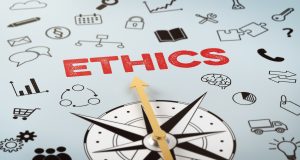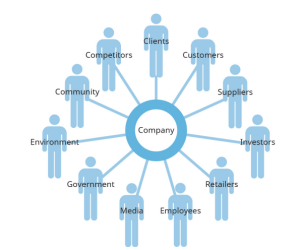Chapter 26: Why Ethics Matter
Chapter Learning Objectives
- 26.1 Define ethics and explain their significance and professional contexts, including how ethical behavior influences reputation and trust. (SLO 1, 5)
- 26.2 Identify common ethical principles and values such as honesty, integrity, fairness, and accountability, and describe their role in workplace decision-making. (SLO 1, 5)
- 26.3 Evaluate scenarios involving ethical dilemmas and apply ethical reasoning to determine appropriate actions. (SLO 1, 5)

Ethics consists of the standards of behavior to which we hold ourselves in our personal and professional lives. It establishes the levels of honesty, empathy, and trustworthiness and other virtues by which we hope to identify our personal behavior and our public reputation. In our personal lives, our ethics sets norms for the ways in which we interact with family and friends. In our professional lives, ethics guides our interactions with customers, clients, colleagues, employees, and shareholders affected by our business practices.
Should we care about ethics in our lives? In our practices in business and the professions? That is the central question we will examine in this chapter and throughout the book. Our goal is to understand why the answer is yes.
Whatever hopes you have for your future, you almost certainly want to be successful in whatever career you choose. But what does success mean to you, and how will you know you have achieved it? Will you measure it in terms of wealth, status, power, or recognition? Before blindly embarking on a quest to achieve these goals,which society considers important, stop and think about what a successful career means to you personally.
Does it include a blameless reputation, colleagues whose good opinion you value, and the ability to think well of yourself? How might ethics guide your decision-making and contribute to your achievement of these goals?
Being a Professional of Integrity
Whenever you think about the behavior you expect of yourself in your personal life and as a professional, you are engaging in a philosophical dialogue with yourself to establish the standards of behavior you choose to uphold, that is, your ethics. You may decide you should always tell the truth to family, friends, customers, clients, and shareholders, and if that is not possible, you should have very good reasons why you cannot. You may also choose never to defraud or mislead your business partners.
You may decide, as well, that while you are pursuing profit in your business, you will not require that all the money on the table come your way. Instead, there might be some to go around to those who are important because they are affected one way or another by your business. These are your stakeholders.
Acting with Integrity
Clients, customers, suppliers, investors, retailers, employees, the media, the government, members of the surrounding community, competitors, and even the environment are stakeholders in a business; that is, they are individuals and entities affected by the business’s decisions. Stakeholders typically value a leadership team that chooses the ethical way to accomplish the company’s legitimate for-profit goals. For example, Patagonia expresses its commitment to environmentalism via its “1% for the Planet” program, which donates 1 percent of all sales to help save the planet. In part because of this program, Patagonia has become a market leader in outdoor gear.

Being successful at work may therefore consist of much more than simply earning money and promotions. It may also mean treating our employees, customers, and clients with honesty and respect. It may come from the sense of pride we feel about engaging in honest transactions, not just because the law demands it but because we demand it of ourselves. It may lie in knowing the profit we make does not come from shortchanging others.

Thus, business ethics guides the conduct by which companies and their agents abide by the law and respect the rights of their stakeholders, particularly their customers, clients, employees, and the surrounding community and environment. We need not subscribe to any religious faith to hold that ethical behavior in business is still necessary. Just by virtue of being human, we all share obligations to one another, and principal among these is the requirement that we treat others with fairness and dignity, including in our commercial transactions.
For this reason, we use the words ethics and morals interchangeably in this chapter, though some philosophers distinguish between them. We hold that “an ethical person” conveys the same sense as “a moral person,” and we do not regard religious belief as a requirement for acting ethically in business and the professions. Because we are all humans and in the same world, we should extend the same behavior to all. It is the right way to behave, but it also burnishes our own professional reputation as business leaders of integrity.
Integrity—that is, unity between what we say and what we do—is a highly valued trait. But it is more than just consistency of character. Acting with integrity means we adhere strongly to a code of ethics, so it implies trustworthiness and incorruptibility. Being a professional of integrity means consistently striving to be the best person you can be in all your interactions with others. It means you practice what you preach, walk the talk, and do what you believe is right based upon reason. Integrity in business brings many advantages, not the least of which is that it is a critical factor in allowing business and society to function properly.
Successful corporate leaders and the companies they represent will take pride in their enterprise if they engage in business with honesty and fair play. To treat customers, clients, employees, and all those affected by a firm with dignity and respect is ethical. In addition, laudable business practices serve the long-term interests of corporations. Why? Because customers, clients, employees, and society at large will much more willingly patronize a business and work hard on its behalf if that business is perceived as caring about the community it serves. And what type of firm has long-term customers and employees? One whose track record gives evidence of honest business practice.
Legal vs. Ethical Compliance
Video
Watch this video to set the baseline about what business ethics are compared to your personal ethics and values?
Many people confuse legal and ethical compliance. They are, however, totally different and call for different standards of behavior. The concepts are not interchangeable in any sense of the word. The law is needed to establish and maintain a functioning society. Without it, our society would be in chaos. Compliance with these legal standards is strictly mandatory: If we violate these standards, we are subject to punishment as established by the law. Therefore, compliance in terms of business ethics generally refers to the extent to which a company conducts its business operations in accordance with applicable regulations, statutes, and laws.
Yet this represents only a baseline minimum. Ethical observance builds on this baseline and reveals the principles of an individual business leader or a specific organization. Ethical acts are generally considered voluntary and personal—often based on our perception of or stand on right and wrong.
Some professions, such as medicine and the law, have traditional codes of ethics. The Hippocratic Oath, for example, is embraced by most professionals in health care today as an appropriate standard always owed to patients by physicians, nurses, and others in the field. This obligation traces its lineage to ancient Greece and the physician Hippocrates.

Business is different in not having a mutually shared standard of ethics. This is changing, however, as evidenced by the array of codes of conduct and mission statements many companies have adopted over the past century. These have many points in common, and their shared content may eventually produce a code universally claimed by business practitioners. What central point might constitute such a code? Essentially, a commitment to treat with honesty and integrity customers, clients, employees, and others affiliated with a business.
The law is typically indebted to tradition and precedence, and compelling reasons are needed to support any change. Ethical reasoning often is more topical and reflects the changes in consciousness that individuals and society undergo. Often, ethical thought precedes and sets the stage for changes in the law.
Behaving ethically requires that we meet the mandatory standards of the law, but that is not enough. For example, an action may be legal that we personally consider unacceptable. Companies today need to be focused not only on complying with the letter of the law but also on going above and beyond that basic mandatory requirement to consider their stakeholders and do what is right.
Ethics and Profitability
Few directives in business can override the core mission of maximizing shareholder wealth, and today that particularly means increasing quarterly profits. Such an intense focus on one variable over a short time (i.e., a short-term perspective) leads to a short-sighted view of what constitutes business success. Measuring true profitability, however, requires taking a long-term perspective. We cannot accurately measure success within a quarter of a year; a longer time is often required for a product or service to find its market and gain traction against competitors, or for the effects of a new business policy to be felt.
Satisfying consumers’ demands, going green, being socially responsible, and acting above and beyond the basic requirements all take time and money. However, the extra cost and effort will result in profits in the long run. If we measure success from this longer perspective, we are more likely to understand the positive effect ethical behavior has on all who are associated with a business.
Having a moral purpose requires focusing on the common good, which precedes the accumulation of profit and results in economic and social benefits. If companies seek the common good, profits generally will follow. Leaders and managers must have an understanding of the context within which their business operates and of how the wealth they create can add positive value to the world. The context within which they act is society, which permits and facilitates a firm’s existence.
Thus, a company enters a social contract with society as whole, an implicit agreement among all members to cooperate for social benefits. Even as a company pursues the maximizing of stockholder profit, it must also acknowledge that all of society will be affected to some extent by its operations. In return for society’s permission to incorporate and engage in business, a company owes a reciprocal obligation to do what is best for as many of society’s members as possible, regardless of whether they are stockholders. Therefore, when applied specifically to a business, the social contract implies that a company gives back to the society that permits it to exist, benefiting the community at the same time it enriches itself.

In addition to taking this more nuanced view of profits, managers must also use a different time frame for obtaining them. Wall Street’s focus on periodic (i.e., quarterly and annual) earnings has led many managers to adopt a short-term perspective, which fails to take into account effects that require a longer time to develop.
For example, charitable donations in the form of corporate assets or employees’ volunteered time may not show a return on investment until a sustained effort has been maintained for years. A long-term perspective is a more balanced view of profit maximization that recognizes that the impacts of a business decision may not manifest for a longer time.
As an example, consider the business practices of Toyota when it first introduced its vehicles for sale in the United States in 1957. For many years, Toyota was content to sell its cars at a slight loss because it was accomplishing two business purposes: It was establishing a long-term relationship of trust with those who eventually would become its loyal U.S. customers, and it was attempting to disabuse U.S. consumers of their belief that items made in Japan were cheap and unreliable. The company accomplished both goals by patiently playing its long game, a key aspect of its operational philosophy, “The Toyota Way,” which includes a specific emphasis on long-term business goals, even at the expense of short-term profit.

What contributes to a corporation’s positive image over the long term? Many factors contribute, including a reputation for treating customers and employees fairly and for engaging in business honestly. Companies that act in this way may emerge from any industry or country. Examples include Fluor, the large U.S. engineering and design firm; illycaffè, the Italian food and beverage purveyor; Marriott, the giant U.S. hotelier; and Nokia, the Finnish telecommunications retailer. The upshot is that when consumers are looking for an industry leader to patronize and would-be employees are seeking a firm to join, companies committed to ethical business practices are often the first to come to mind.
Why should stakeholders care about a company acting above and beyond the ethical and legal standards set by society? Simply put, being ethical is simply good business. A business is profitable for many reasons, including expert management teams, focused and happy employees, and worthwhile products and services that meet consumer demand. One more and very important reason is that they maintain a company philosophy and mission to do good for others.
Year after year, the nation’s most admired companies are also among those that had the highest profit margins. Going green, funding charities, and taking a personal interest in employee happiness levels adds to the bottom line!
Consumers want to use companies that care for others and our environment. During the years 2008 and 2009, many unethical companies went bankrupt. However, those companies that avoided the “quick buck,” risky and unethical investments, and other unethical business practices often flourished. If nothing else, consumer feedback on social media sites such as Yelp and Facebook can damage an unethical company’s prospects.
Stockholders, Stakeholders, and Goodwill
Earlier in this chapter, we explained that stakeholders are all the individuals and groups affected by a business’s decisions. Among these stakeholders are stockholders (or shareholders), individuals and institutions that own stock (or shares) in a corporation. Understanding the impact of a business decision on the stockholder and various other stakeholders is critical to the ethical conduct of business.
Indeed, prioritizing the claims of various stakeholders in the company is one of the most challenging tasks business professionals face. Considering only stockholders can often result in unethical decisions; the impact on all. The positive feeling stakeholders have for any particular company is called goodwill, which is an important component of almost any business entity, even though it is not directly attributable to the company’s assets and liabilities. Among other intangible assets, goodwill might include the worth of a business’s reputation, the value of its brand name, the intellectual capital and attitude of its workforce, and the loyalty of its established customer base. Even being socially responsible generates goodwill. The ethical behavior of managers will have a positive influence on the value of each of those components. Goodwill cannot be earned or created in a short time, but it can be the key to success and profitability.
You can test the validity of this claim yourself. When you choose a company with which to do business, what factors influence your choice? Let us say you are looking for a financial advisor for your investments and retirement planning, and you have found several candidates whose credentials, experience, and fees are
approximately the same. Yet one of these firms stands above the others because it has a reputation, which you discover is well earned, for telling clients the truth and recommending investments that seemed centered on the clients’ benefit and not on potential profit for the firm. Wouldn’t this be the one you would trust with your investments?
Or suppose one group of financial advisors has a long track record of giving back to the community of which it is part. It donates to charitable organizations in local neighborhoods, and its members volunteer service hours toward worthy projects in town. Would this group not strike you as the one worthy of your investments? That it appears to be committed to building up the local community might be enough to persuade you to give it your business. This is exactly how a long-term investment in community goodwill can produce a long pipeline of potential clients and customers.
Conclusion
Ethics sets the standards that govern our personal and professional behavior. To conduct business ethically, we must choose to be a professional of integrity. The first steps are to ask ourselves how we define success and to understand that integrity calls on us to act in a way that is consistent with our words. There is a distinct difference between legal compliance and ethical responsibility, and the law does not fully address all ethical dilemmas that businesses face. Sound ethical practice meets the company’s culture, mission, or policies above and beyond legal responsibilities.
How to cite this chapter:
Byars, S.M., Stanberry, K. (2018) Chapter 26: Why Ethics Matter. In Pouska, B. (Ed.), Business Professionalism. New Mexico Open Educational Resources Consortium Pressbooks. https://nmoer.pressbooks.pub/businessprofessionalism/
Licenses and Attributions
References
Cunningham, L. A. (2015, May 1). The philosophy of Warren E. Buffett. The New York Times. https://www.nytimes.com/2015/05/02/business/dealbook/the-philosophy-of-warren-e-buffett.html
Durden, T. (2017, September 7). Massive data breach at Equifax: As many as 143 million Social Security numbers hacked. Zero Hedge. http://www.zerohedge.com/news/2017-09-07/massive-data-breach-equifax-many-143-million-social-security-numbers-hacked
Georgescu, P. (2017, July 26). Doing the right thing is just profitable. Forbes. https://www.forbes.com/sites/petergeorgescu/2017/07/26/doing-the-right-thing-is-just-profitable/
Global Ethics Solutions. (2021). What is business ethics? [Video]. YouTube. (Licensed under Standard YouTube License – All Rights Reserved.)
Kocieniewski, D. (2012, September 11). Whistle-blower awarded $104 million by IRS. The New York Times. http://www.nytimes.com/2012/09/12/business/whistle-blower-awarded-104-million-by-irs.html
Liker, J. (2005). The Toyota way: Fourteen management principles from the world’s greatest manufacturer. McGraw-Hill.
Mejia, Z., & Ward, M. (2017, October 4). Warren Buffett says this one investment “supersedes all others.” CNBC Make It. https://www.cnbc.com/2017/10/04/warren-buffett-says-this-one-investment-supersedes-all-others.html
Naeini, A., Dutt, A., Angus, J., Mardirossian, S., & Bonfanti, S. (2015, June 7). A shoe for a shoe, and a smile. Business Today. http://www.businesstoday.in/magazine/lbs-case-study/toms-shoes-shoes-for-free-cause-marketing-strategy-case-study/story/219444.html
Nonaka, I., & Takeuchi, H. (2011, May). The big idea: The wise leader. Harvard Business Review. https://hbr.org/2011/05/the-big-idea-the-wise-leader
TOMS.com. (n.d.). Giving shoes. https://www.toms.com/what-we-give-shoes
Yang, J. L. (2013, August 26). Maximizing shareholder value: The goal that changed corporate America. The Washington Post. https://www.washingtonpost.com/business/economy/maximizing-shareholder-value-the-goal-that-changed-corporate-america/2013/08/26/26e9ca8e-ed74-11e2-9008-61e94a7ea20d_story.html
Original Chapter Source
Original chapter source: Adapted from Business Ethics by Kurt Stanberry and Stephen M. Byars.

